- Home
- Christie Ridgway
An Offer He Can't Refuse
An Offer He Can't Refuse Read online
Christie
RIDGWAY
AN OFFER HE CAN’T REFUSE
For Cynthia De Nardi,
who read my first romance stories
before we needed bras,
before we could wear makeup,
before we knew the first thing about boys.
Here’s to us, old friend.
Contents
One
Téa Caruso had once been very, very bad. During a…
Two
Johnny Magee reached for the phone on his desk, paused,…
Three
Following the brush with her grandfather, Téa escaped from the…
Four
Whistling the cheery opening of a TVLand Andy Griffith episode,…
Five
Johnny followed the designer home. He didn’t have much choice,…
Six
By some stroke of luck, Téa had a second chance…
Seven
Johnny didn’t call Téa the next morning because he had…
Eight
There was a tall and wide white box on Téa’s…
Nine
Riding in the passenger seat of her father’s Ford F-150,…
Ten
Johnny hadn’t been to the cemetery in sixteen years. He…
Eleven
All good things ended. She already knew that, Téa reminded…
Twelve
“You’re here early.”
Thirteen
At Johnny’s knock on her door, Téa swiped up her…
Fourteen
It had been his dick talking, damn it, Johnny thought…
Fifteen
Though he’d gotten the information he was after in the…
Sixteen
Rachele let herself into the house, the low glow from…
Seventeen
“What the hell are you doing here?”
Eighteen
At the gunshot-like sounds, Johnny started, his body twitching so…
Nineteen
Later that afternoon, Johnny did what any self-respecting older sibling…
Twenty
Téa studied the rows of hair styling products for sale…
Twenty-one
Dusk was overtaking day as Téa climbed the steps toward…
Twenty-two
Trust me, he’d said.
Twenty-three
It took Johnny a few days to make it back…
Twenty-four
Téa barreled out of the front door of her office…
Twenty-five
Téa’s first reaction: surprise. Second reaction: excitement. Third reaction: anger…
Twenty-six
As Johnny drove back to Palm Springs, Téa made him…
Twenty-seven
Rachele danced around the kitchen, preparing the evening meal for…
Twenty-eight
Téa sat at a table on the patio outside of…
Twenty-nine
Johnny screeched to a stop in the apex of the…
Thirty
Johnny had never felt any ghosts in the tiki room,…
Thirty-one
Téa stared at the stranger she’d been sleeping with. Minutes…
Thirty-two
Cal peered through the open bedroom doorway as Johnny worked…
Thirty-three
Rachele sat with Cal at a table out of the…
Thirty-four
Joey threw herself into a seat at the table where…
Thirty-five
Johnny was sorry that his father had killed hers. Téa…
Thirty-six
Rachele rocked back as if her father had struck her…
Thirty-seven
They were in a collective state of shock, Téa decided,…
pilogue
A week after the big birthday bash, two of Salvatore…
About the Author
Praise
Other Books by Christie Ridgway
Copyright
About the Publisher
One
“Begin the Beguine”
Frank Sinatra
Frank Sinatra Story in Music (1946)
Téa Caruso had once been very, very bad. During a morning spent closeted in the perfume-saturated powder room of Mr. and Mrs. William Duncan’s Spanish-Italian-Renaissance-inspired Palm Springs home, discussing Baby Jesus and the Holy Mother, she wondered if today was the day she started paying for it. Toward noon, she emerged from the clouds—both heavenly and olfactory—with a Chanel No. 5 hangover and fingernail creases in her palms as deep as the Duncans’ quarter-mile lap pool.
Standing on the pillowed-limestone terrace outside, she allowed herself a sixty-second pause for fresh air, yet still managed to multitask the moment by completing a quick appearance-check as well. Even someone with less artistic training than Téa would know that her Mediterranean coloring and generous curves were made for low necklines and gypsy shades, but her Mandarin-collared, dove-gray linen dress was devised to button-up, smooth-out, tuck away. Though she could never feel completely innocent, she preferred to at least look that way.
The reflection in her hand-mirror presented no jarring surprises. The sun leant an apricot cast to her olive skin. Tilted brown eyes, a slightly patrician nose, cheekbones and jawline now defined after years of counting calories instead of chowing down on cookies. Assured that her buttons were tight, her mascara unsmudged, and her hair still controlled in its long, dark sweep, she snapped the compact shut. Then, setting off in the direction of her car, she swapped mirror for cell phone and speed-dialed her interior design firm, Inner Life.
“She’s still insisting on Him,” she told her assistant when she answered. “Find out who can hand-paint a Rembrandt-styled Infant Jesus in the bottom of a porcelain sink.”
Continuing her forward march, she checked her watch. “Any messages? I have lunch with my sisters up next.”
“Nikki O’Neal phoned and mentioned a redo of her dining room,” her assistant replied. “Something about a mural depicting the Ascension.”
The Ascension?
Téa’s steps faltered, slowed. “No,” she groaned. “That means Mrs. D. has spilled her plans. Now we’ll be hearing from every one of her group at Our Lady of Mink.”
A segment of Téa’s client list—members of the St. Brigit’s Guild at the posh Our Lady of Mercy Catholic Church—cultivated their competitive spirits as well as their Holy Spirit during their weekly meetings. One woman would share a new idea for home decor, prompting the next to take the same theme to even greater—more ostentatious—heights.
Three years before it had been everything vineyard, then sea life turned all the rage, and now…good God.
“The Ascension?” Téa muttered. “These women must be out of their minds.”
But could she really blame them? Palm Springs, California, had a grand tradition of the grandiose, after all. Walt Disney had owned a home here. Elvis. Liberace.
It was just that when she’d opened her business, filled with high artistic aspirations and a zealous determination to make over the notorious Caruso name, she hadn’t foreseen the pitfalls. Like how the ceaseless influx of rent and utility bills and the unsteady-trickle-and-occasional-torrent that was her cash flow meant she couldn’t be picky when it came to choosing design jobs.
Like how that could result in gaining woeful renown as designer of all things overdone. She groaned again.
“Oh, and Téa…” Her assistant’s voice rose in an expectant lilt. “His Huskiness called.”
Her stomach lurched, pity party forgotten. “What? Who?”
“Johnny Magee.”
Of course, Johnny Magee. Her assistant referred to t
he man they’d never met by an ever-expanding lexicon of nicknames that ranged from the overrated to the out-and-out ridiculous. To Téa, he was simply her One Chance, her Answered Prayers, her Belief in Miracles.
“Why didn’t you forward it to my cell?” she demanded, her footsteps regaining speed. Between assistants and electronics, not once had she exchanged information with him voice-to-voice.
“And miss out on having the Love Machine rumble in my ear? No way. His ‘hello’ makes me horny. Besides, you don’t like interruptions when meeting with a client.”
Unless it was him! Sure, if she bagged Johnny Magee’s project and their contact progressed beyond fax and e-mail, then the man would most likely prove a major disappointment. But from the instant she’d read “generous budget” and “complete redesign in mid-century modern” on his first communication, she’d decided theirs was the perfect relationship.
“I swear,” her assistant continued with all the fervor of a former Catholic schoolgirl, “just the word ‘bedroom’ in that raspy voice of his makes me dream of dark nights, dark passion, and dark velvet stroking over my skin.”
“Dark velvet,” Téa echoed, as in her mind a more practical brand of fantasy burst to life. “Dark velvet and all other materials billed at forty percent over cost.”
What a fantasy it was. Not only would winning this job mean a measure of financial relief, it meant so much beyond that. Respect in the industry. A more sophisticated portfolio to show prospective clients. All of which added up to a future free from marble-cherubed parlors, Venus de Milo verandahs, and Samson-and-Delilah-inspired dressing rooms.
But then—beep—Téa’s wristwatch alarm snapped her back to reality. With her car now in sight, she doubled her pace. “I’m late. If he calls again, put him through.”
“There’s one more thing.”
The reluctance in Rachele’s voice caused Téa to slow again. “What is it?”
“Well, uh, an invitation came for you in the mail today. Engraved, heavy manila paper, it feels like the handmade stuff that—”
“An invitation to what?”
A hesitation. A hitch in her assistant’s breath. “You believe in that whole ‘don’t shoot the messenger’ thing, right?”
“Rachele—”
“Given your family’s history, can you blame me for asking?”
“Rachele—”
“Okay, fine.” Words tumbled out. “An invitation to a birthday party, a really big one, I’m guessing, at the Desert Star resort at the end of the month. My father’s been invited, I’ve been invited. And, of course, you. It’s…it’s…it’s your grandfather’s eightieth birthday party.”
Téa’s feet lost their purchase, making an ineffective scrabble against the ground’s uneven surface. As she swung out an arm to steady herself against the roof of her car, her briefcase clubbed the side window with a heavy thunk.
I was kidding about this being the day to start paying! was her first thought.
What kind of booby trap is this? was the second.
She ended the call with clumsy fingers, then slid into the driver’s seat to join the slow-moving parade of Hummers, Caddies, and golf carts that cruised the Coachella Valley floor. An invitation.
Navigating on autopilot, she traveled along Bob Hope Drive, to Frank Sinatra Drive, to Country Club Drive. Packed into the congested midday traffic, her car inched past luxurious homes in stark bone-white and lush gardens colored in vibrant bougainvillea pinks and show-me-the money greens. An invitation to his birthday party.
In summer, the sun bore down with such ruthless intensity that structures, sky, and landscape paled from the heat, and even the edges of the well-watered golf courses curled up like dry sponges. The wealthy fled. But now it was autumn in Palm Springs, meaning the surroundings were stunning, the temperature was in the pleasant low-eighties, and if the cars around her were any judge, all the Hollywood hotties and megacorp magnates who had run away in May were back in full force, believing themselves safe from the ugly side of the desert.
The ugly, dangerous side her grandfather knew so well.
An invitation to his birthday party, she thought once again, nerves fluttering in her belly. Why would Cosimo set a snare for her now?
Finally, she reached the Café Azul. Avoiding the eye of the hovering valet, she parked her Volvo wagon in what she termed the “self-help” section of the lot and took the time to swipe a brush through her hair, a wet pinkie along each eyebrow arch, and clear gloss over her long-lasting lipcolor. Then, finger-ironing the seatbelt wrinkles from her dress, she hurried toward the café’s entrance.
Still mulling over the unexpected invitation, she was halfway across the parking lot when her heel caught in a crack and she found herself stumbling again. Without a car to catch her this time, she landed hard on the opposite leg. Maybe it was the jolt to her knee, maybe it was her quick gasp of air, but suddenly her common sense kicked in.
An invitation to his birthday party. So what? Big whoop. It wasn’t a royal decree or a legal summons. As a matter of fact, it was probably a mistake.
Hadn’t she successfully avoided her grandfather and all those who surrounded him for years?
There was no reason to think that would change now.
Even the shivery sixty-seven degrees of the restaurant’s foyer couldn’t cool her more upbeat mood, nor did having to wait to speak to the harried hostess. “The rest of my party hasn’t arrived,” she said, when it was her turn. “But we have a reservation for Caruso.”
“Caruso!” a voice echoed from behind her.
Startled, Téa glanced over her shoulder, but didn’t recognize the forty-something brunette in a shantung silk suit the color of lemon sherbet.
“I’m sorry,” the woman continued loudly. “But did you say your last name was Caruso?”
Téa tightened her grip on the strap of her purse. Usually, strangers never dared more than whisper about her family behind her back. She managed a stiff turn anyway. “Excuse me?”
The woman smiled. “My maiden name is Caputo. Caruso, so similar, leaped right out at me.”
Téa’s clenching hand relaxed.
“You’re right,” she replied. Noting again the woman’s expensive outfit, she considered her current tower of bills and her ever-present need to drum up business. The smile she tacked on was full of warm good will. “The names are very much alike.”
“Not only that.” Apparently encouraged, the woman stepped closer. “But ever since we moved to Palm Springs I’ve been hearing story after story about the infamous Carusos.”
Téa’s smile dropped away. Heat washed across her skin. “I’m not—I don’t…” We’re an ordinary family! All her life she’d wanted to say that.
Since she was twelve years old and her father had gone missing, presumed dead, she’d been unable to believe it.
The woman waved her hand. “Oh, no need explaining to me! I understand perfectly. People think if your last name ends in a vowel, then you’re automatically in the Mafia. Ridiculous, right?”
Ridiculous, right. Women were supposed to be kept well clear of the illegal activities, and could never be members of La Cosa Nostra. The secret she kept hidden, the things she’d done, weren’t that usual, even for a mob boss’s daughter.
The stranger warmed to her subject. “The idea that an organization of brutish Italian thugs has power in this city, let alone the state, why that’s television, not…” Her voice petered out as her attention strayed somewhere over Téa’s shoulder.
The entire restaurant went quiet too, voices stilling, silverware and ice cubes ceasing to rattle. Through the glass entry doors in front of her, Téa saw a gleaming black limousine slither up to the front entrance.
Hadn’t she successfully avoided her grandfather and all those who surrounded him for years?
The question mocked her now as instinct commanded she sidle closer to the foyer wall. The action provided no real protection. As they approached from behind her—presumably from th
e restaurant’s private room in the rear—their scent reached her on a rustle of the air. The faint yet distinct scent of expensive colognes. The citrus tang of shaving soap bladed away with a straightedged razor.
When they drew nearer, she swore she could even smell the silk of their subtly patterned ties and the tropical-weight cashmere of their suits—never black, never gray, but putty or khaki or even celery, as if the lighter colors could disguise their dark reputation. The soles of their shoes—Italian leather, of course—murmured like rumors against the parquet floor.
Her father’s memory came to her, unbidden, unwelcome. Unresolved.
Passing Téa, her grandfather and his cadre pretended not to see her, though she knew very well they did, realized they would have been told of her presence the instant her sling-back pump stepped through the restaurant’s doors. But they followed her wishes, and she followed the six of them with her gaze as they exited.
“Who was that?” The other woman found her voice just as the limo crept away.
The men of my family. My ordinary family. As if anyone, upon seeing them, would believe that.
Though they weren’t your stereotypical organization of brutish Italian thugs, either. As head of a successful gourmet food company, the legitimate part of the world had crowned her grandfather the Sun-Dried Tomato King. To its underbelly he was known as the Cudgel. But to Téa’s mind, he and the others were much more like stilettos. Elegant, sharp, lethal.
They were the ones she’d been successfully avoiding for years. The ones who, until this moment, she’d believed she could continue successfully avoiding for years to come.

 ANTE UP (7-Stud Club Book 3)
ANTE UP (7-Stud Club Book 3) Bachelor Boss
Bachelor Boss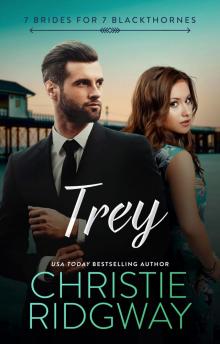 Trey
Trey Almost Paradise (Book 4)
Almost Paradise (Book 4) ALL IN (7-Stud Club Book 1)
ALL IN (7-Stud Club Book 1) My Quickie Wedding (Heartbreak Hotel Book 3)
My Quickie Wedding (Heartbreak Hotel Book 3) The Seduction (Billionaire's Beach Book 5)
The Seduction (Billionaire's Beach Book 5)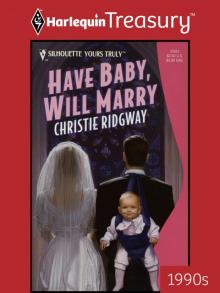 Have Baby, Will Marry
Have Baby, Will Marry Bungalow Nights (Beach House No. 9)
Bungalow Nights (Beach House No. 9) Almost Always AMAZON
Almost Always AMAZON Zane (7 Brides for 7 Soldiers Book 3)
Zane (7 Brides for 7 Soldiers Book 3) Wishful Sinful (Rock Royalty Book 5)
Wishful Sinful (Rock Royalty Book 5) SLOW PLAY (7-Stud Club Book 4)
SLOW PLAY (7-Stud Club Book 4)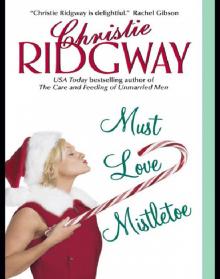 Must Love Mistletoe
Must Love Mistletoe Keep On Loving you
Keep On Loving you Light My Fire
Light My Fire Touch Me
Touch Me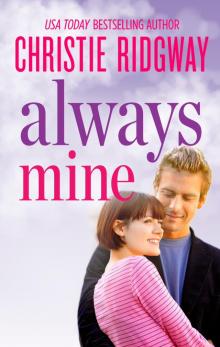 Always Mine
Always Mine Take Me Tender
Take Me Tender IN LOVE WITH HER BOSS
IN LOVE WITH HER BOSS Not Just the Nanny
Not Just the Nanny Who Do You Love (Rock Royalty Book 7)
Who Do You Love (Rock Royalty Book 7) Our Last First Kiss KOBO
Our Last First Kiss KOBO Can't Hurry Love
Can't Hurry Love Crush on You
Crush on You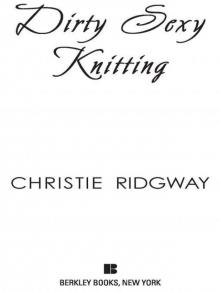 Dirty Sexy Knitting
Dirty Sexy Knitting Almost Wonderful
Almost Wonderful Beach House No. 9
Beach House No. 9 Wild Child (Rock Royalty #6)
Wild Child (Rock Royalty #6)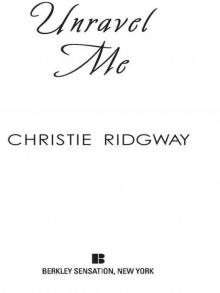 Unravel Me
Unravel Me Make Me Lose Control
Make Me Lose Control Me and Mr. Jones
Me and Mr. Jones Almost Always_Book 2
Almost Always_Book 2 Love Her Madly
Love Her Madly The Scandal (Billionaire's Beach Book 4)
The Scandal (Billionaire's Beach Book 4) Do Not Disturb
Do Not Disturb Not Another New Year's
Not Another New Year's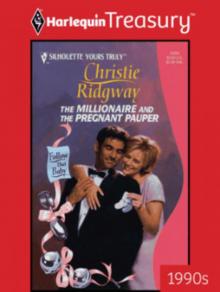 The Millionaire and the Pregnant Pauper
The Millionaire and the Pregnant Pauper The Secret (Billionaire's Beach Book 6)
The Secret (Billionaire's Beach Book 6) Beach House Beginnings
Beach House Beginnings RUNAWAY
RUNAWAY Take Me Forever (Billionaire's Beach Book 2)
Take Me Forever (Billionaire's Beach Book 2) Love Me Two Times (Rock Royalty Book 8)
Love Me Two Times (Rock Royalty Book 8)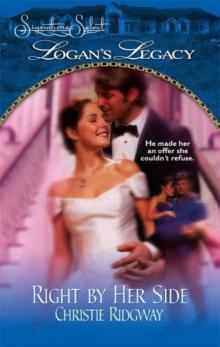 Right by Her Side
Right by Her Side Can't Fight This Feeling (Cabin Fever)
Can't Fight This Feeling (Cabin Fever)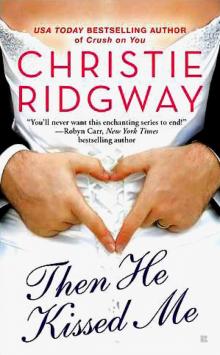 Then He Kissed Me
Then He Kissed Me Take My Breath Away
Take My Breath Away Knox KOBO
Knox KOBO I Still Do 02 - Runaway Bride Returns!
I Still Do 02 - Runaway Bride Returns!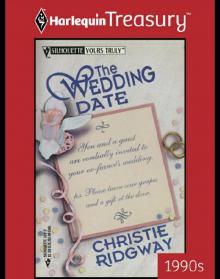 The Wedding Date
The Wedding Date THIS PERFECT KISS
THIS PERFECT KISS Me and Mr. Jones (Heartbreak Hotel Book 2)
Me and Mr. Jones (Heartbreak Hotel Book 2) The Thrill of It All
The Thrill of It All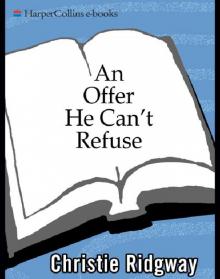 An Offer He Can't Refuse
An Offer He Can't Refuse The Love Shack
The Love Shack Runaway Bride Returns!
Runaway Bride Returns! Not Another New Year's (Holiday Duet Book 2)
Not Another New Year's (Holiday Duet Book 2) I Still Do
I Still Do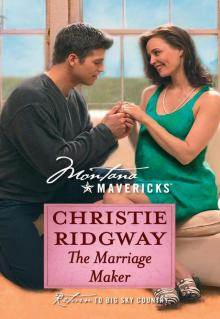 The Marriage Maker
The Marriage Maker